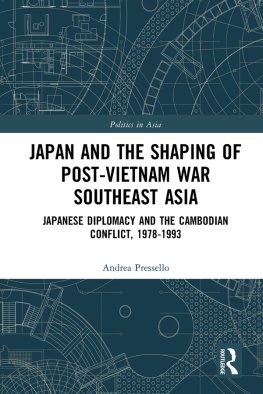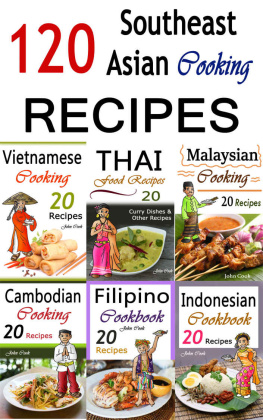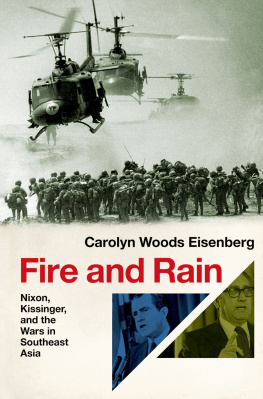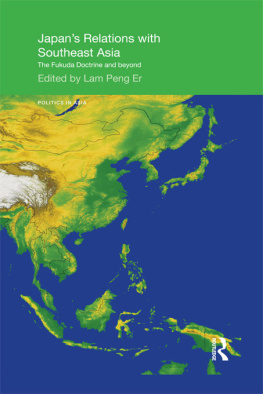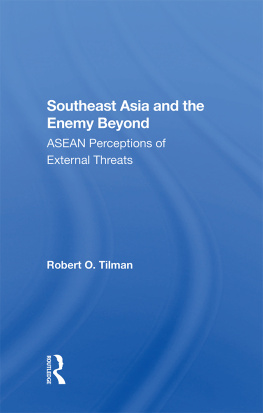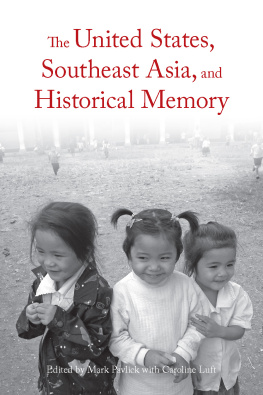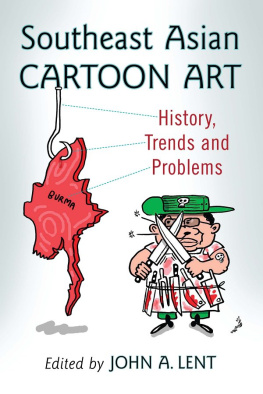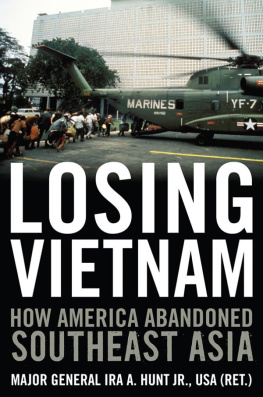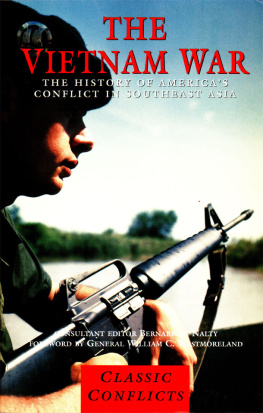
Japan and the Shaping of Post-Vietnam War Southeast Asia
The Vietnamese invasion of Cambodia in 1978 and the consequent outbreak of the Cambodian conflict brought Southeast Asia into instability and deteriorated relations between Vietnam and the subsequently established Vietnam-backed government in Cambodia on the one hand and the Association of Southeast Asian Nations (ASEAN) countries on the other. As a result of the conflict, the Soviet Union established a foothold in Southeast Asia while China, through its support of the anti-Vietnam Cambodian resistance, improved relations with Southeast Asian countries such as Thailand. Japans Fukuda Doctrine its declared priorities of promoting cooperative and friendly relations between Communist Indochinese nations and non-Communist ASEAN countries became increasingly at odds with Japans role as a member of the Free World in the broader Cold War confrontation. Tokyo had to steer a path between Washingtons hard-line policy of isolating Vietnam and its own desire to prevent regional destabilization.
Against this background, this book addresses the following questions: what was Japans response to the challenges to its objectives and interests in Southeast Asia and to the Fukuda Doctrine? What role did Japan play for the settlement of the conflict in Cambodia? How did Japans diplomacy on the Cambodian problem affect the Japanese role in the region? It argues that Japans contribution was more active than has widely been recognized.
Andrea Pressello is Assistant Professor at the National Graduate Institute for Policy Studies (GRIPS), Tokyo, Japan.
Politics in Asia series
New Dynamics in USChina Relations
Contending for the Asia Pacific
Edited by Mingjiang Li and Kalyan M. Kemburi
Illiberal Democracy in Indonesia
The ideology of the family-state
David Bourchier
Chinas Power and Asian Security
Edited by Mingjiang Li and Kalyan M. Kemburi
Sino-US Energy Triangles
Resource Diplomacy Under Hegemony
Edited by David Zweig and Yufan HAO
Advancing the Regional Commons in the New East Asia
Edited by Siriporn Wajjwalku, Kong Chong Ho and Osamu Yoshida
Institutionalizing East Asia
Mapping and Reconfiguring Regional Cooperation
Edited by Alice D. Ba, Cheng Chwee Kuik and Sueo Sudo
Singapore
Negotiating State and Society, 19652015
Edited by Jason Lim and Terence Lee
Political Survival and Yasukuni in Japans Relations with China
Mong Cheung
Regional Community Building in East Asia
Countries in Focus
Edited by Lee Lai To and Zarina Othman
Contested Ideas of Regionalism in Asia
Baogang He
Governing Global-City Singapore
Legacies and Futures After Lee Kuan Yew
Kenneth Paul Tan
Negotiating the USJapan Alliance
Japan Confidential
Yukinori Komine
Chinese Foreign Policy Under Xi
Edited by Hoo Tiang Boon
A History of Human Rights Society in Singapore
19652015
Edited by Jiyoung Song
Japans Security and Economic Dependence on China and the United States
Cool Politics, Lukewarm Economics
Keisuke Iida
Japan and the Shaping of Post-Vietnam War Southeast Asia
Japanese Diplomacy and the Cambodian Conflict, 19781993
Andrea Pressello
Japan and the Shaping of Post-Vietnam War Southeast Asia
Japanese Diplomacy and the Cambodian Conflict, 19781993
Andrea Pressello
First published 2018
by Routledge
2 Park Square, Milton Park, Abingdon, Oxon OX14 4RN
and by Routledge
711 Third Avenue, New York, NY 10017
Routledge is an imprint of the Taylor & Francis Group, an informa business
2018 Andrea Pressello
The right of Andrea Pressello to be identified as author of this work hasbeen asserted by him in accordance with sections 77 and 78 of theCopyright, Designs and Patents Act 1988.
All rights reserved. No part of this book may be reprinted or reproduced orutilized in any form or by any electronic, mechanical, or other means, nowknown or hereafter invented, including photocopying and recording, or inany information storage or retrieval system, without permission in writingfrom the publishers.
Trademark notice: Product or corporate names may be trademarks orregistered trademarks, and are used only for identification and explanationwithout intent to infringe.
British Library Cataloguing in Publication Data
A catalogue record for this book is available from the British Library
Library of Congress Cataloging in Publication Data
Names: Pressello, Andrea, author.
Title: Japan and the shaping of post-Vietnam War Southeast Asia :Japanese
diplomacy and the Cambodian conflict, 19781993 / Andrea Pressello.
Description: New York : Routledge, 2018. | Series: Politics in Asia series |Includes bibliographical references and index.
Identifiers: LCCN 2017011433| ISBN 9781138200234 (hardback) |ISBN 9781315514932 (ebook)
Subjects: LCSH: JapanForeign relationsSoutheast Asia. | SoutheastAsiaForeign relationsJapan. | Cambodian-Vietnamese Conflict,19771991Peace.
Classification: LCC DS525.9.J3 P74 2018 | DDC 959.604/2dc23LC record available at https://lccn.loc.gov/2017011433
ISBN: 978-1-138-20023-4 (hbk)
ISBN: 978-1-315-51493-2 (ebk)
Typeset in Galliard
by Wearset Ltd, Boldon, Tyne and Wear
Contents
This book draws largely from the research I carried out as a doctoral student in the Security and International Studies Program at the National Graduate Institute for Policy Studies (GRIPS) in Tokyo. I am highly grateful to Professors Iwama Yoko, Michishita Narushige, Miyagi Taiz, and Nobori Amiko for their valuable guidance and comments on my research. My gratitude goes also to the anonymous reviewers for their useful inputs and suggestions. Professor Sud Sueos comments on part of my research at the 2011 Annual Convention of the Japan Association of International Relations have also been important for the realization of this work. Finally, I am indebted to the several diplomats, officials, politicians, and scholars who, both in Japan and overseas, have patiently answered my questions and shared their experiences and inspiring insights with me. I am solely responsible for the analyses and any factual errors of this book.
This book is derived in part from articles published in Japanese Studies on March 31, 2014 (available online: www.tandfonline.com/ http://dx.doi.org/ 10.1080/10371397.2014.886506), in Japan Forum on July 1, 2013 (available online: www.tandfonline.com/ http://dx.doi.org/10.1080/09555803.2013.8 02368), and in Asian Studies Review on March 5, 2013 (available online: www. tandfonline.com/ http://dx.doi.org/10.1080/10357823.2012.760531).
In this book, Japanese names are written according to the Japanese system of first indicating the last name and then the given name. The only exceptions are in the footnotes. The sources in Japanese language used in this book have been translated in English by the author.
The objective of this book is to clarify Japans role in the shaping of the post-Vietnam War order in Southeast Asia by examining its diplomacy on the Cambodian conflict (19781993), the main source of regional instability in those years. In the period after World War II, the Japanese considered Southeast Asia to be important in the process of rebuilding their economy and international role. The fact that Japan did not have diplomatic relations with the Peoples Republic of China until the early 1970s and had a difficult relationship with the Korean Peninsula increased the importance of Southeast Asian countries for the Japanese. This regions natural resources and markets were deemed attractive in Japan. When Tokyo began to provide official development assistance (ODA), a large part of it as well as increasingly of Japanese trade and investments went to Southeast Asia. During the 1970s, a growingly confident Japan, whose economy had by then become the second largest in the Free World, looked at Southeast Asia also as instrumental to enhance its international role by acting as a sort of representative of this region in the developed world. The fact that vital sea routes, through which oil from the Middle East was shipped to resource-scant Japan, were located in proximity of Southeast Asian waters further increased the strategic importance of this region, especially in the aftermath of the first oil shock of 1973. Realizing peace and stability in Southeast Asia became, therefore, one of the important issues for Japans foreign policy. However, the fluid regional environment during the 1970s complicated the realization of such an objective. The end of the war in Vietnam brought significant changes in Southeast Asia. A division was consolidated between the non-communist countries of ASEAN (Association of Southeast Asian Nations) on the one hand which, during the 1970s, included Indonesia, Malaysia, the Philippines, Singapore, and Thailand and, on the other, the Indochinese communist regimes of Cambodia, Laos, and Vietnam. After the rather traumatic experience of its participation in the Vietnamese conflict, the United States reduced its involvement and military presence in the region. This created room for the Soviet Union and China to increase their influence in Southeast Asia, a scenario that the Japanese expected to have adverse implications for Southeast Asias stability and for Tokyos interests in that region. With one of the driving forces being the objective of stopping such a scenario from materializing, Japan intensified efforts to promote development in Southeast Asia and cooperative and friendly relations between Indochinese and ASEAN countries; this was expected to strengthen their resilience and make them less vulnerable to external sources of destabilization. These objectives were central in the policy toward Southeast Asia that Japan formulated during the 1970s. One of its major articulations was contained in the speech that Prime Minister Fukuda Takeo delivered in Manila in August 1977, which became known as the Fukuda Doctrine. He made clear that Japan had no ambition to become a military power, and that it desired positive relations with Southeast Asian nations based on mutual trust and understanding. The third pillar of the speech enunciated Japans commitment to help realize peace and prosperity in Southeast Asia by supporting the development of the ASEAN countries and the establishment of peaceful and cooperative relations between them and the communist states of Indochina.

